 The call of the mosque in the early morning hours. The laugther and shouts of people, at 6am. The giggle of children, all day. The honking of horns of motorbikes and cars, an endless river of metal. The cries of the street vendors selling soto ayam and bubur and mie baso; the chimes of the bell of the ice cream vendor’s bicycle, drawing the children through the narrow alley ways like the Pied Piper. No dogs, because this is a Muslim country, instead dozens of stray and hungry cats. Young women in headscarves and tight jeans. Everywhere shouts of „what’s your name“ and „where are you from“, of „Bule, Bule“. The youth meets up at milk bars and shisha places, the old ones are sitting in front of their houses and comment. Many have a smartphone.
The call of the mosque in the early morning hours. The laugther and shouts of people, at 6am. The giggle of children, all day. The honking of horns of motorbikes and cars, an endless river of metal. The cries of the street vendors selling soto ayam and bubur and mie baso; the chimes of the bell of the ice cream vendor’s bicycle, drawing the children through the narrow alley ways like the Pied Piper. No dogs, because this is a Muslim country, instead dozens of stray and hungry cats. Young women in headscarves and tight jeans. Everywhere shouts of „what’s your name“ and „where are you from“, of „Bule, Bule“. The youth meets up at milk bars and shisha places, the old ones are sitting in front of their houses and comment. Many have a smartphone.
A country, an experience – this time as a volunteer in Cianjur, Western Java, Indonesia.
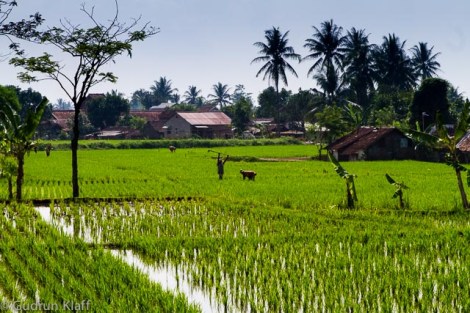

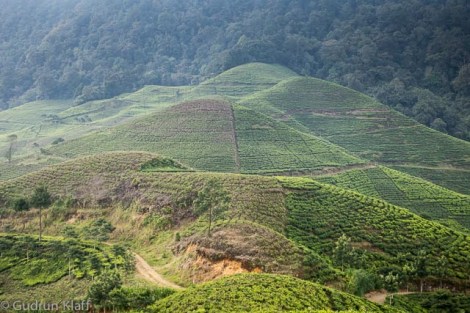
Teeplantage

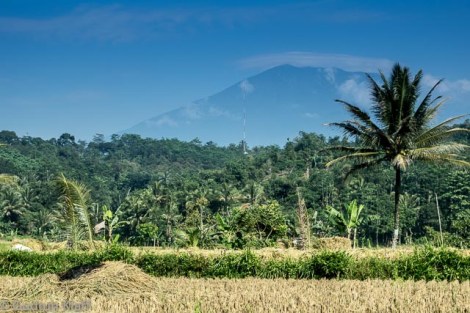
Cianjur isn’t really a tourist hot spot – the town is inland from Jakarta, a ca. 2.5 hours (or 8 hours, in my case, time in Java is „rubber time“) bus journey. It’s quite a big city, about 300,000 people, surrounded by beautiful rice fields, a volcano towering above. When tourists stray here, they are usually taking part in the homestay- and volunteering program Volunteer in Java which I am highly recommending. Against a small fee for food and accommodation, you live in the house of Kumis and his mother, mostly together with other volunteers, live the local life, and visit the schools to speak a bit of English with the pupils.
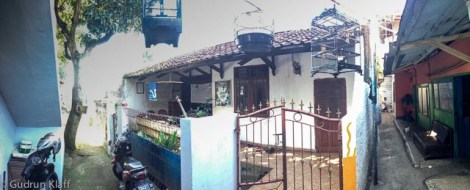
The house of Kumis and his mother
Differently from my previous teaching assignments, no teaching skills were required; instead, I was pushed in front of various groups in all sorts of schools, to answer the usual questions of „where are you from what is your name where do you live what is your favourite food“, motivate the pupils by emphasizing the importance of English for their future, and play simple games with them. It was more exhausting than it sounds, and at times felt a bit like „The Travelling Freak Show feat. Miss Dorothy“.



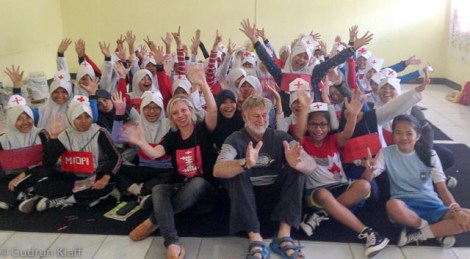
Next to me an Australian volunteer
In many ways, „developed“ und „developing“ countries are worlds apart, and both sides can learn a lot from each other. A banality: Living in the West isn’t Nirvana; and yet, our way of life is the idea of paradise for so many people, who, strangely, look so much happier than us. Life here isn’t Nirvana either, the daily problems are too real – loss of employment, an illness, an accident have grave consequences for the chances of survival, much more so than in the West.
The dream of many is to study in the US or Europe, to better their chances in their own countries. It is the look in the eyes of the pupils that expresses this dream, and which makes it clear that it’s not about teaching a few words of English, but that one embodies dream and motivation. It doesn’t matter that the „civilized“ West has it’s own problems – who are we, to deny progress and prosperity with reference to lifestyle diseases, burn-out, depression, heart attacks and social isolation? To experience a different culture, a different way of thinking and working, and a higher level of education and income will help the countries in the long run in the fight against poverty, environmental problems (a huge issue in Asia), and illness. When, at the same time, the „Westerner“ adopts some of the happy laughter, the joy of living, the hospitality, the living in the „Now“ and in the community, both sides profit, and that is what volunteering really is about, because you can “live” both sides, and act as a bridge. I really recommend it, also in one’s home country, it’s a great aid against lifestyle diseases.
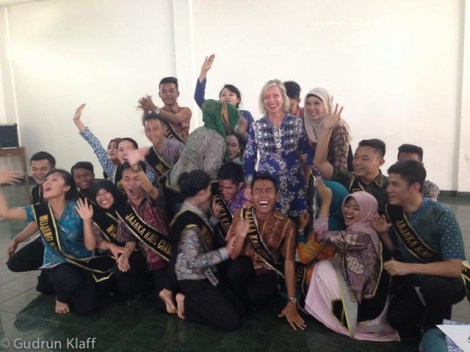
On a less philosophical note, teaching English can also help to avoid these typical conversations, such as the ones I just had in a hotel: „My room stinks of cigarette smoke, do you have non-smoking rooms?“ „Yes, madam“. „Thanks, I’d like to move into one then, please“. „We only have smoking rooms“. „Eh…??“ – „Here are your access details for the internet.“ „Thanks.“ (Half an hour later). „Sorry, I cannot access your internet, what am I doing wrong?“ „We don’t have internet.“ „Eh…??“.
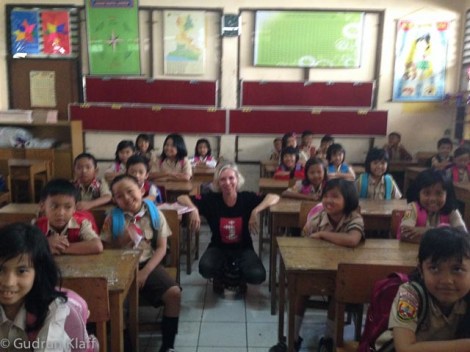
Of all the experiences at the schools, the one at a primary school was the most impressive. Approximately 35 pupils, a teacher, and I. The kids were to ask me questions. For a nerve-racking 70 minutes, the children screamed – just because, or at each other; they kicked each other; they hit each other; one fell off her chair; another banged on his desk. During all this, the teacher stood calmly in front of the class, sometimes shouting over the din, and didn’t think anything unusual was happening. I was stunned – that’s not how I remember my time at primary school. Nostaligia overcame me, for Nepal – pupils who don’t say anything at all – I’d underestimated the peacefulness of this. We did manage five meaningful questions (and shouted answers), and then I fled, to spend the remainder of the day on the terrace, trembling and withdrawn – I am too old for these things. After that, I was kept away from primary schools, and whilst the classes at all the schools were very lively, they couldn’t match this.
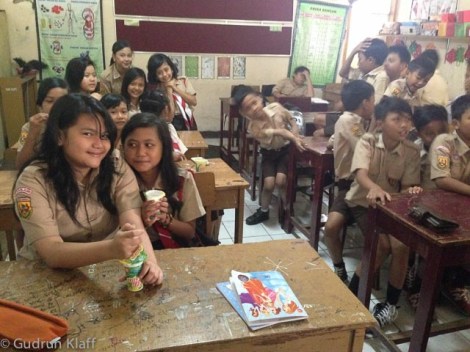
Mädchen sind einfacher zu unterrichten…
Light-skinned, blond haired foreigners are called „bule“ (pronounced boolay), which means „albino“. The kids loved to stand in front of the terrace every morning and shout Bule Bule for what felt like hours.

Bule Bule
Rather involuntarily – wearing a headscarf or hijab. The only dress code for us was usually “long trousers, long sleeves” (Java is mostly Muslim). Only at a Muslim school was I asked to please wear a hijab.  All Indonesians who saw the picture thought it looked great – I on the other hand don’t think I am a headscarf person…
All Indonesians who saw the picture thought it looked great – I on the other hand don’t think I am a headscarf person… 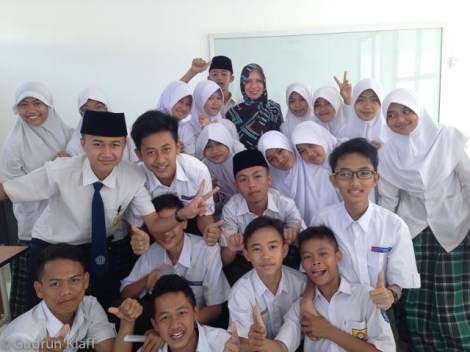
I had, after some teething problems (I am getting used to the fact that it always takes a while until I get used to new living conditions, and mine change constantly), a great time in Cianjur. Kumis is also a tour guide, and he makes sure that his guests can discover the beauty of his country with mountain- and motor bikes. I met wonderful people, had a fun time at the schools, ate way too much tasty food, and am happy that I had this experience.

At the competition for Mr and Miss Cianjur Tourism”

This goat didn’t have a long life. Purchased in the morning, a toy for the kids by noon, and in the cooking pan by dinner time…

The mode of transport in Indonesia – the motor bike
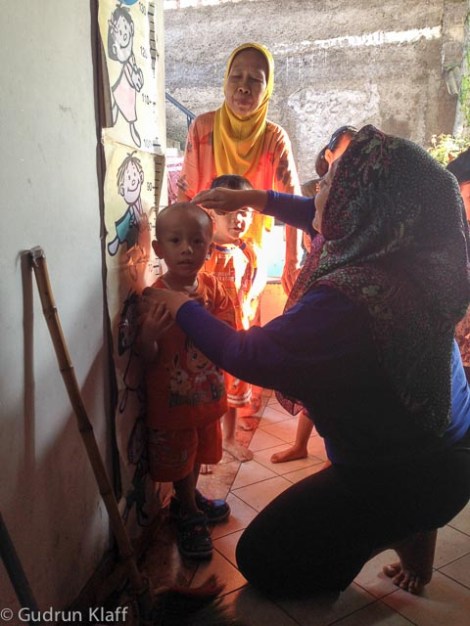
Monthly measuring and weighing of the kids

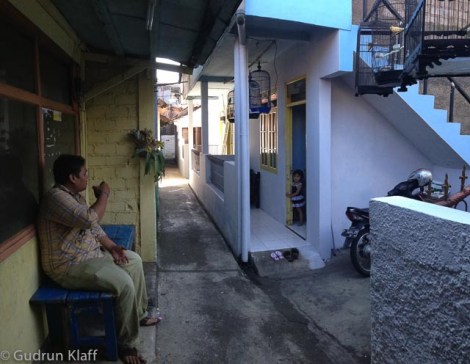
Typical living quarters



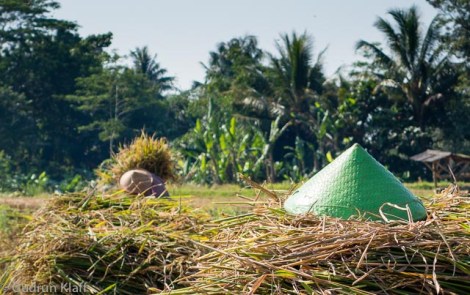









Gudrun, you look so happy! This is great; the whole experience really does seem to benefit all involved. I’m looking forward to reading about your next adventure…maybe, in Ubud. 🙂
Thanks Val 🙂 Well, after more than 7 months in mostly off-the-beaten-track destinations in SE Asia I’ll need some time to get used to Ubud, to be honest with you – plus, this here is NOT good for my budget, the shops are just too nice ;). I’ll try and spend most of my time either in the rice fields or meditating…
Agreed; the shops are fantastic! Spending time in quiet reflection’s always good, but so is some indulgence. By indulgence, I mean eating a really good meal, getting a massage and soaking in the hot springs. (I’ll send you the name of the spa that has hot and cold springs, since I can’t remember it off the top of my head). Be well!
Sounds as though you are having a great time – lovely article, great photos and I think the hijab suits you
Thanks Gwyn, I am having a great time, but I don’t think I’ll adopt the hijab permanently, although it IS a great item for bad hair days…
p.s Gudrun, the hot and cold springs, as well as a mineral pool, are at the Tjampuhan hotel (on the main road near Bridges). A really lovely place to spend a hot day.
Hi Val, thank you, I left Ubud early, just to give you a warning, I didn’t really like the town, for my own reasons, I’ve just published a blog entry about this, don’t take it too seriously :). Wishing you happiness – Gudrun
Got it. :)…Btw, I agree that the hijab looks lovely on you, bad hair day or not.